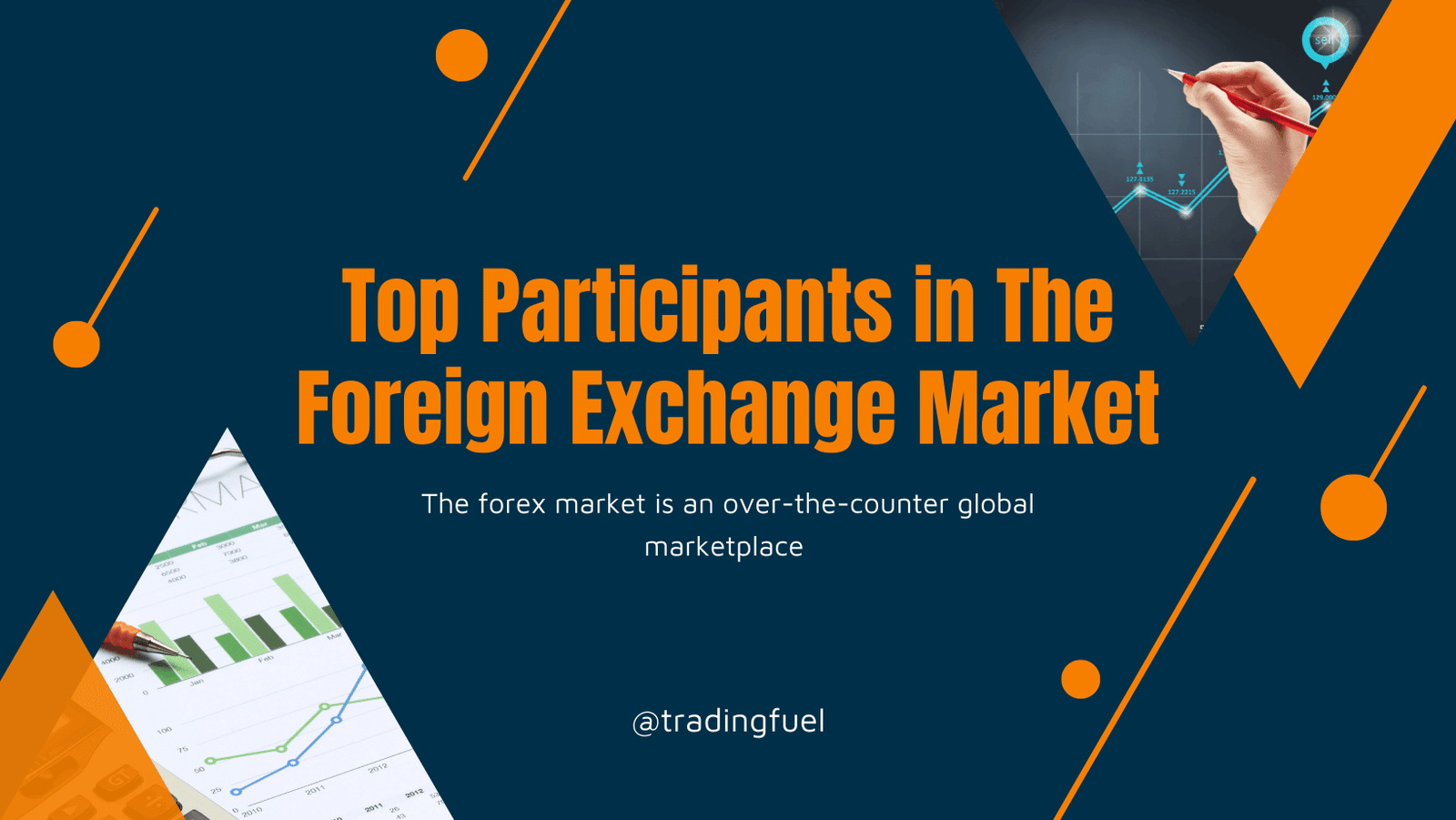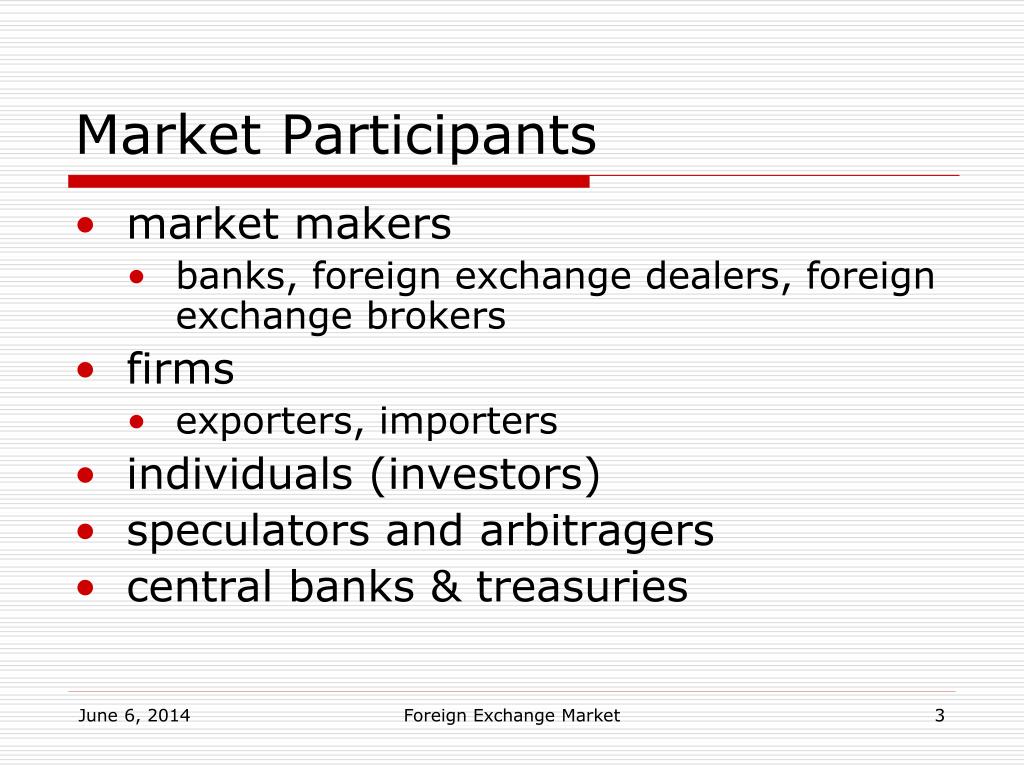Primary participants in foreign exchange market - Primary participants in the foreign exchange market play a pivotal role in shaping the global financial landscape. From commercial banks and central banks to investment banks and corporations, these entities engage in a complex interplay that drives currency exchange rates and influences economic activity worldwide.
This comprehensive guide delves into the roles, functions, and strategies of these primary participants, providing valuable insights into the intricacies of the foreign exchange market.
Primary Participants in Foreign Exchange Market
 Commercial banks play a crucial role in the foreign exchange market, acting as intermediaries between buyers and sellers of foreign currencies. They provide a wide range of services, including currency exchange, international payments, and trade finance.
Commercial banks play a crucial role in the foreign exchange market, acting as intermediaries between buyers and sellers of foreign currencies. They provide a wide range of services, including currency exchange, international payments, and trade finance. Commercial Banks in the Forex Market
Commercial banks are major players in the forex market, accounting for a significant portion of global foreign exchange transactions. They offer a variety of services to their customers, including: - Currency exchange: Commercial banks provide currency exchange services to individuals and businesses, allowing them to convert one currency into another. - International payments: Commercial banks facilitate international payments, such as wire transfers and documentary credits, for businesses and individuals. - Trade finance: Commercial banks provide trade finance services, such as letters of credit and export credit insurance, to support international trade. Some of the largest commercial banks that are major players in the forex market include: - Citibank - HSBC - JPMorgan Chase - Deutsche Bank - UBSAdvantages and Disadvantages of Using Commercial Banks
There are several advantages to using commercial banks for foreign exchange transactions: - Convenience: Commercial banks offer a convenient way to exchange currencies and make international payments. - Security: Commercial banks provide a secure environment for foreign exchange transactions. - Expertise: Commercial banks have experienced staff who can provide advice and guidance on foreign exchange matters. However, there are also some disadvantages to using commercial banks: - Fees: Commercial banks typically charge fees for foreign exchange transactions. - Exchange rates: Commercial banks' exchange rates may not be as competitive as those offered by other market participants. - Limited access: Commercial banks may not offer all the currencies or services that are available in the wider forex market.Central Banks

Central banks play a crucial role in the foreign exchange market by managing the monetary policy of their respective countries. They are responsible for setting interest rates, managing the money supply, and overseeing the stability of the financial system.
Further details about foreign exchange market open time is accessible to provide you additional insights.
Major Central Banks in the Forex Market
- Federal Reserve (US)
- European Central Bank (Eurozone)
- Bank of England (UK)
- Bank of Japan (Japan)
- People's Bank of China (China)
These central banks have a significant impact on the foreign exchange market due to the size of their economies and the influence of their monetary policies on global financial markets.
Obtain a comprehensive document about the application of foreign exchange market jacob clifford that is effective.
Impact of Central Bank Policies on the Forex Market
- Interest rate decisions: Central banks' decisions on interest rates can significantly impact currency values. Higher interest rates tend to attract foreign investment, leading to an appreciation of the domestic currency.
- Quantitative easing: When central banks engage in quantitative easing (QE), they purchase government bonds to increase the money supply. This can lead to a depreciation of the domestic currency as it reduces its relative value compared to other currencies.
- Foreign exchange intervention: Some central banks may intervene in the foreign exchange market by buying or selling their own currency to influence its value. This is typically done to maintain a desired exchange rate or to stabilize the financial system.
Investment Banks
Investment banks play a significant role in the foreign exchange market, facilitating transactions between various participants. They offer a wide range of services, including currency trading, hedging, and advisory services. Investment banks act as intermediaries between buyers and sellers of currencies, providing liquidity and depth to the market. They quote prices for different currencies and execute trades on behalf of their clients. Investment banks also provide hedging services to help clients manage their foreign exchange risk. By entering into forward contracts or options, investment banks allow clients to lock in exchange rates and protect themselves against adverse currency fluctuations.Major Investment Banks in Forex
Some of the major investment banks that are active in the forex market include:- Goldman Sachs
- JPMorgan Chase
- Citigroup
- Bank of America Merrill Lynch
- Deutsche Bank
Advantages of Using Investment Banks for Forex Transactions
There are several advantages to using investment banks for foreign exchange transactions:- Access to global markets: Investment banks have a global presence and can provide access to a wide range of currencies and markets.
- Competitive pricing: Investment banks can offer competitive pricing due to their large trading volumes and relationships with other market participants.
- Expertise and advice: Investment banks have experienced professionals who can provide expert advice and guidance on foreign exchange transactions.
Disadvantages of Using Investment Banks for Forex Transactions, Primary participants in foreign exchange market
There are also some disadvantages to using investment banks for foreign exchange transactions:- Transaction fees: Investment banks typically charge fees for their services, which can add to the cost of foreign exchange transactions.
- Potential conflicts of interest: Investment banks may have conflicts of interest if they are also acting as advisors to clients on other transactions.
- Limited access to retail investors: Investment banks typically focus on serving institutional clients and may not offer services to retail investors.
Hedge Funds
Hedge funds play a significant role in the foreign exchange market as they seek to generate alpha by exploiting inefficiencies and market inefficiencies. They employ various strategies, including carry trade, trend following, and algorithmic trading, to profit from currency fluctuations.Major Hedge Funds in Forex
Some of the most prominent hedge funds in the forex market include: - Bridgewater Associates - GLG Partners - Soros Fund Management - Renaissance Technologies - CitadelHedge Fund Strategies in Forex
Hedge funds utilize diverse strategies to capitalize on foreign exchange trading opportunities. These strategies include: - Carry Trade: Borrowing currencies with low interest rates and investing in currencies with higher interest rates to profit from the interest rate differential. - Trend Following: Identifying and riding currency trends by buying or selling currencies that are expected to appreciate or depreciate in value. - Algorithmic Trading: Using computer algorithms to execute trades based on predefined parameters, often relying on technical analysis or statistical models.Corporations
Corporations play a crucial role in the foreign exchange market, facilitating international trade and managing their financial exposure to currency fluctuations. Corporations engage in foreign exchange trading primarily to facilitate international business transactions. They buy and sell foreign currencies to pay for imports, receive payments for exports, and invest in foreign markets. Additionally, corporations use foreign exchange trading to hedge against currency risks and speculate on currency movements to potentially generate profits.Major Players in Forex Market
Some of the major corporations that are active in the foreign exchange market include:- Apple Inc.
- Microsoft Corp.
- Toyota Motor Corp.
- Volkswagen AG
- BP Plc.
Retail Traders: Primary Participants In Foreign Exchange Market
Retail traders are individuals who trade foreign exchange (forex) currencies in relatively small amounts, typically for personal profit. They are considered the smallest participants in the forex market and usually do not have the same level of resources and expertise as institutional traders.
Remember to click foreign exchange market jobs to understand more comprehensive aspects of the foreign exchange market jobs topic.
Advantages of Retail Trading
There are several advantages to retail trading in the forex market:
- Accessibility: Retail trading is open to anyone with an internet connection and a small amount of capital.
- Flexibility: Retail traders can trade from anywhere in the world and set their own hours.
- Leverage: Retail traders can use leverage to increase their potential profits, but this also increases their risk.
Disadvantages of Retail Trading
There are also several disadvantages to retail trading in the forex market:
- High risk: Forex trading is a risky activity, and retail traders can lose their entire investment.
- Lack of regulation: The forex market is not as heavily regulated as other financial markets, which can make it more difficult for retail traders to protect themselves from fraud.
- Lack of experience: Retail traders often do not have the same level of experience as institutional traders, which can make it difficult for them to make profitable trades.
Tips for Retail Traders
Here are some tips for retail traders on how to succeed in the forex market:
- Educate yourself: Before you start trading, it is important to educate yourself about the forex market and how to trade it.
- Start small: When you start trading, it is important to start small and gradually increase your risk as you gain experience.
- Use a demo account: A demo account allows you to trade with virtual money, which is a great way to practice before you start trading with real money.
- Manage your risk: Risk management is one of the most important aspects of forex trading. It is important to set stop-loss orders and take profits to limit your losses.
Other Participants
Besides the primary participants, there are numerous other participants who play significant roles in the foreign exchange market.
These participants include:
- Money Brokers
- Foreign Exchange Dealers
- Currency Exchanges
- Tourists
- Speculators
Money Brokers
Money brokers are intermediaries who connect buyers and sellers of foreign currency. They facilitate the exchange of currencies by providing a platform where participants can trade with each other.
Money brokers typically charge a fee for their services, which is usually a percentage of the transaction value.
Foreign Exchange Dealers
Foreign exchange dealers are companies that buy and sell foreign currency on behalf of their clients.
They typically offer a range of services, including currency exchange, hedging, and advisory services.
Currency Exchanges
Currency exchanges are physical locations where individuals can exchange foreign currency.
They are typically found in airports, train stations, and other tourist areas.
Currency exchanges typically charge a fee for their services, which is usually a percentage of the transaction value.
Tourists
Tourists are individuals who travel to foreign countries and need to exchange their currency.
They typically exchange their currency at currency exchanges or banks.
Speculators
Speculators are individuals or companies that buy and sell foreign currency in order to make a profit.
They typically use leverage to increase their potential profits.
Final Wrap-Up

In conclusion, primary participants in the foreign exchange market form a dynamic and diverse ecosystem that facilitates global trade, investment, and economic growth. Understanding their roles and interactions is crucial for navigating the complexities of this ever-evolving market.
